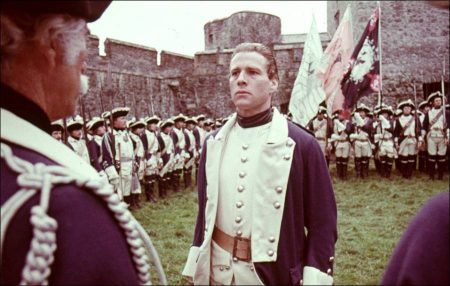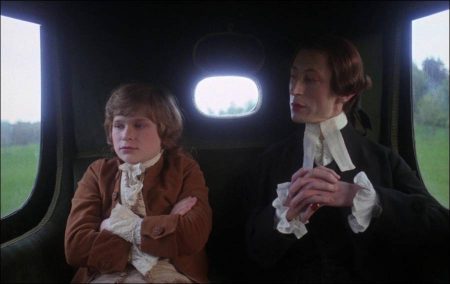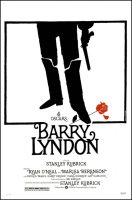Taglines: After reaching the top, where can you go… except down?
Barry Lyndon movie storyline. The rise and fall of the adult life of Irishman Redmond Barry (Ryan O’Neal), who, in his later life, would be known as Barry Lyndon, from the mid to late eighteenth century, is presented. Growing up in humble means, largely due to the early death of his aspiring lawyer father, the potential family breadwinner, Barry strives to live up to the standards of being a gentleman in every respect of the word, including monetarily.
He leads a disjointed early adult life in trying to find his way, sometimes being unfairly given some hard knocks as the ways of the world work around him. He seems to find his stride in falling in love with wealthy and married Lady Lyndon (Marisa Berenson), who he ends up marrying following the death of her elderly first husband, Sir Charles Lyndon (Frank Middlemass).
In taking over the affairs of the Lyndon mansion, Barry is able to live a means of his liking, all off the Lyndon’s now quickly dwindling wealth due to Barry’s squandering. As Barry is without money of his own, Mrs. Barry (Marie Kean) encourages her son to work toward a peerage as a means to have money of his own, as she fears that if Lady Lyndon were to die.
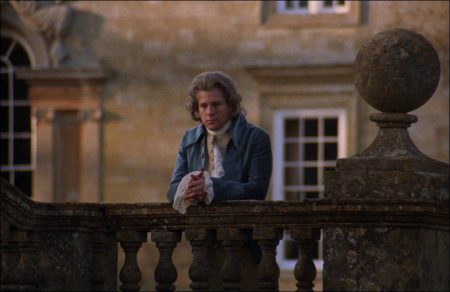
She would leave all of what would remain of the Lyndon wealth to her son, Barry’s stepson, Lord Bullingdon (Leon Vitali), with whom Barry has always had an antagonistic relationship to the point of Lord Bullingdon wanting revenge on the woes that his stepfather has created in their lives. Outwardly, Lord Bullingdon may seem to be the cause of Barry’s fall, however, it may be more attributed to Barry being unable to adapt to any of the lives into which he is thrust to truly reach his goal of being a gentleman.
Barry Lyndon is a 1975 period drama film written, directed, and produced by Stanley Kubrick, based on the 1844 novel The Luck of Barry Lyndon by William Makepeace Thackeray. Starring Ryan O’Neal, Marisa Berenson, Patrick Magee, Leonard Rossiter, and Hardy Krüger, the film recounts the early exploits and later unravelling of a fictional 18th-century Irish rogue and opportunist who marries a rich widow to climb the social ladder and assume her late husband’s aristocratic position.
The film “was not the commercial success Warner Bros. had been hoping for” within the United States, although it fared better in Europe. In the US it earned $9.1 million. Ultimately, the film grossed a worldwide total of $31.5 million on an $11 million budget. This mixed reaction saw the film (in the words of one retrospective review) “greeted, on its release, with dutiful admiration – but not love. Critics… rail[ed] against the perceived coldness of Kubrick’s style, the film’s self-conscious artistry and slow pace. Audiences, on the whole, rather agreed…”
Brief Review
As with any Stanley Kubrick film, there are a great deal of subtle messages and deeper meanings. The main theme explored in Barry Lyndon is one of fate and destiny. Barry is pushed through life by a series of key events, some of which seem unavoidable. As Roger Ebert says, “He is a man to whom things happen.” He declines to eat with the highwaymen Captain Feeney, where he would most likely have been robbed, but is robbed anyway farther down the road.
The narrator repeatedly emphasizes the role of fate as he announces events before they unfold on screen, like Brian’s death and Bullingdon seeking satisfaction. This theme of fate is also developed in the recurring motif of the painting. Just like the events featured in the paintings, Barry is participating in events which always were.
Another major theme is between father and son. Barry lost his father at a young age and throughout the film he seeks and attaches himself to father-figures. Examples include his uncle, Grogan, and the Chevalier. When given the chance to be a father, Barry loves his son to the point of spoiling him. This contrasts with his role as a father to Lord Bullingdon, whom he disregards and punishes.
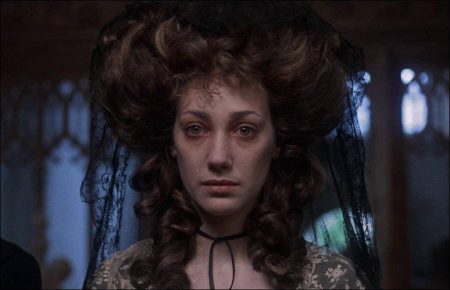
About the Production
Stanley Kubrick began production on Barry Lyndon after his 1971 film A Clockwork Orange. He had originally intended to direct a biopic on Napoleon, but lost his financing because of the commercial failure of the similar 1970 film Waterloo. Kubrick eventually directed Barry Lyndon, set partially during the Seven Years’ War, utilising his research from the Napoleon project. Filming began in December 1973 and lasted roughly eight months, taking place in England, Ireland, East Germany and West Germany.
The film’s cinematography has been described as ground-breaking. Especially notable are the long double shots, usually ended with a slow backwards zoom, the scenes shot entirely in candlelight, and the settings based on William Hogarth paintings. The exteriors were filmed on location in Ireland, England and West Germany, with the interiors shot mainly in London. The production was troubled; there were problems related to logistics, weather, and even politics (Kubrick feared that he might be an IRA hostage target).
Barry Lyndon won four Oscars at the 48th Academy Awards: Best Scoring: Original Song Score and Adaptation or Scoring: Adaptation, Best Costume Design, Best Art Direction and Best Cinematography. Although some critics took issue with the film’s slow pace and restrained emotion, its reputation, like that of many of Kubrick’s works, has strengthened over time, with many now regarding it as one of his greatest achievements.
The film’s period setting allowed Kubrick to indulge his penchant for classical music, and the film score uses pieces by Bach, Vivaldi, Paisiello, Mozart, and Schubert. The piece most associated with the film, however, is the main title music, Handel’s Sarabande from the Keyboard suite in D minor.
Originally for solo harpsichord, the versions for the main and end titles are performed with orchestral strings, harpsichord, and timpani. The score also includes Irish folk music, including Seán Ó Riada’s song “Women of Ireland”, arranged by Paddy Moloney and performed by The Chieftains. “The British Grenadiers” also features in scenes with Redcoats marching.
Barry Lyndon (1975)
Directed by: Stanley Kubrick
Starring: Ryan O’Neal, Marisa Berenson, Patrick Magee, Hardy Krüger, Gay Hamilton, Godfrey Quigley, Steven Berkoff, Marie Kean, Murray Melvin, Frank Middlemass, Leon Vitali, Dominic Savage
Screenplay by: Stanley Kubrick
Production Design by: Ken Adam
Cinematography by: John Alcott
Film Editing by: Tony Lawson
Costume Design by: Milena Canonero, Ulla-Britt Söderlund
Art Direction by: Roy Walker
MPAA Rating: None.
Distributed by: Warner Bros. Pictures
Release Date: December 18, 1975
Views: 170
